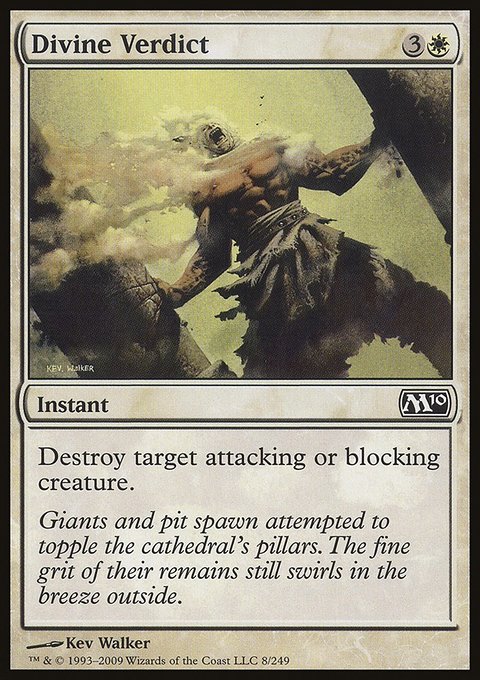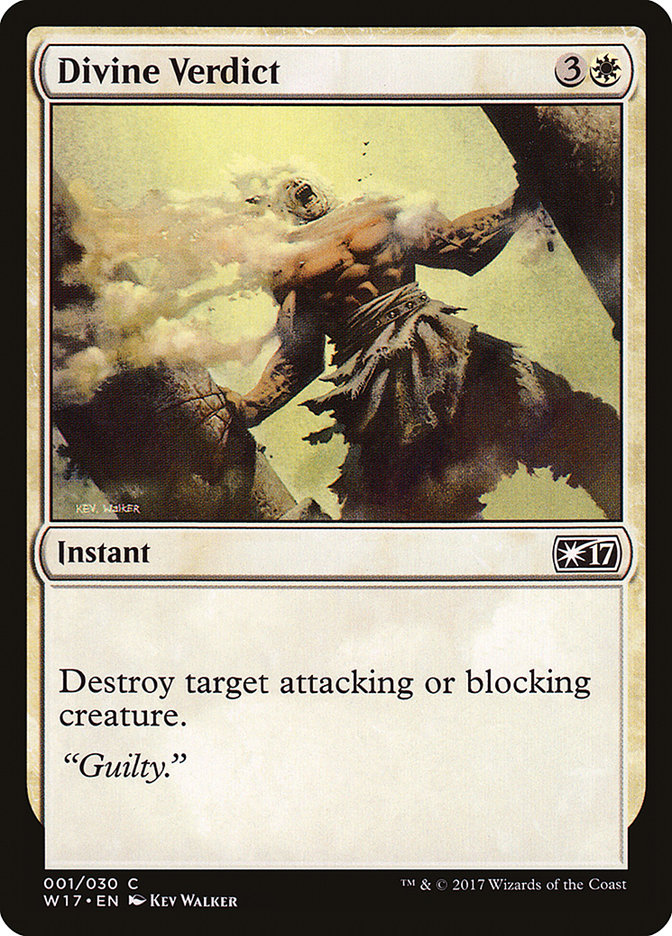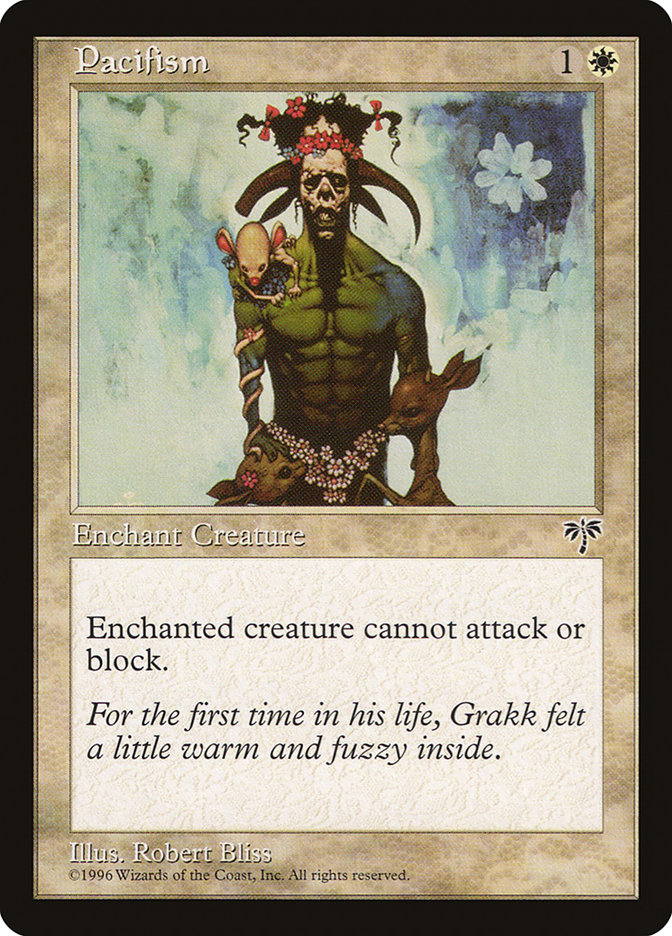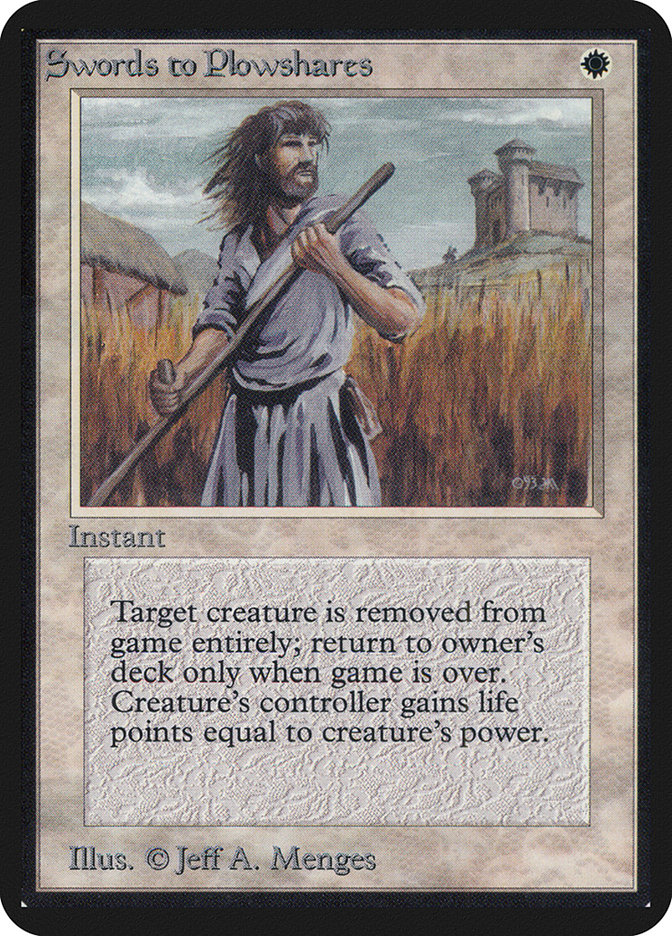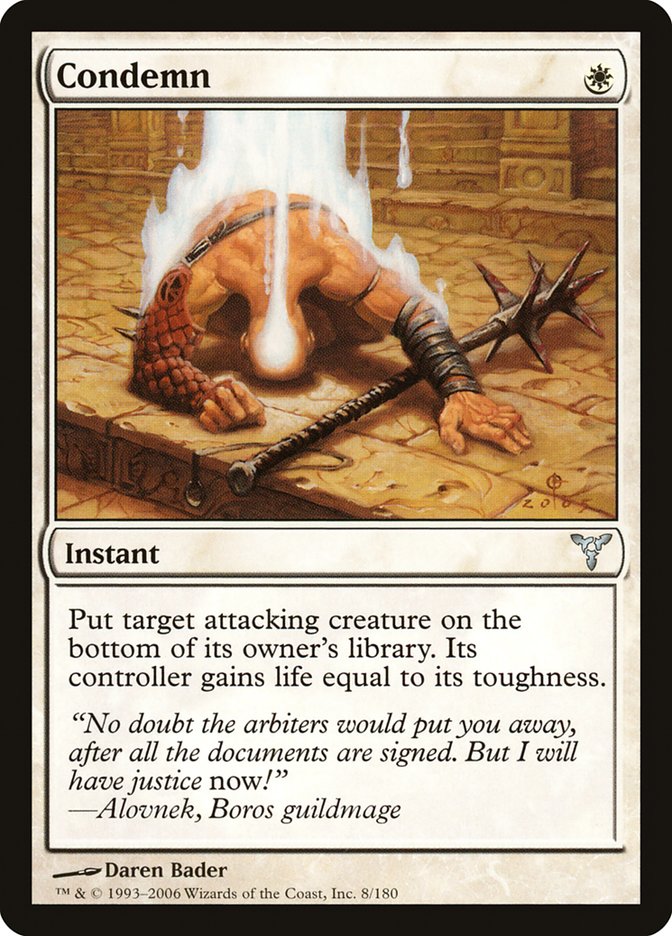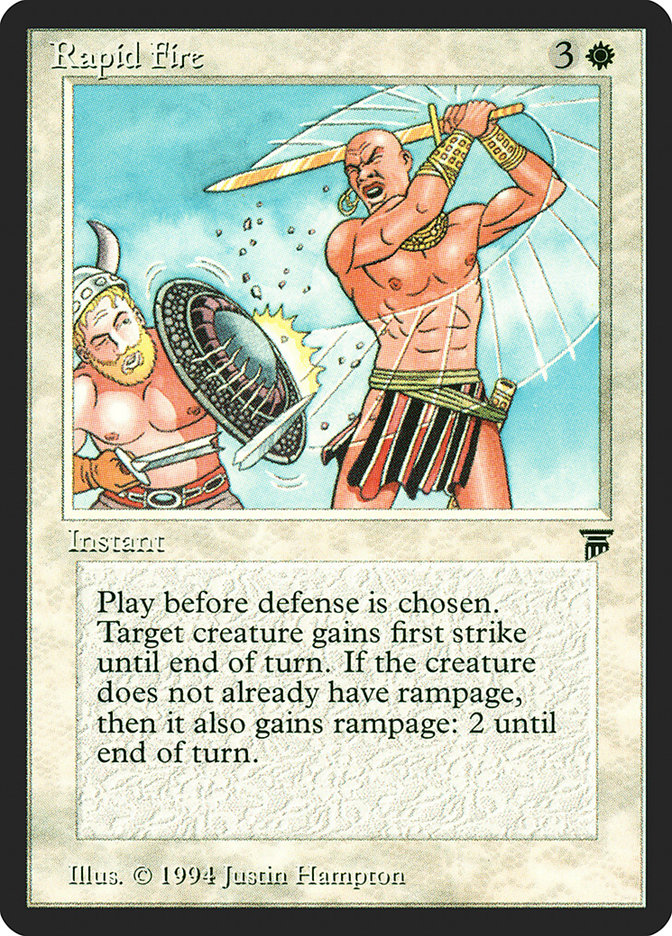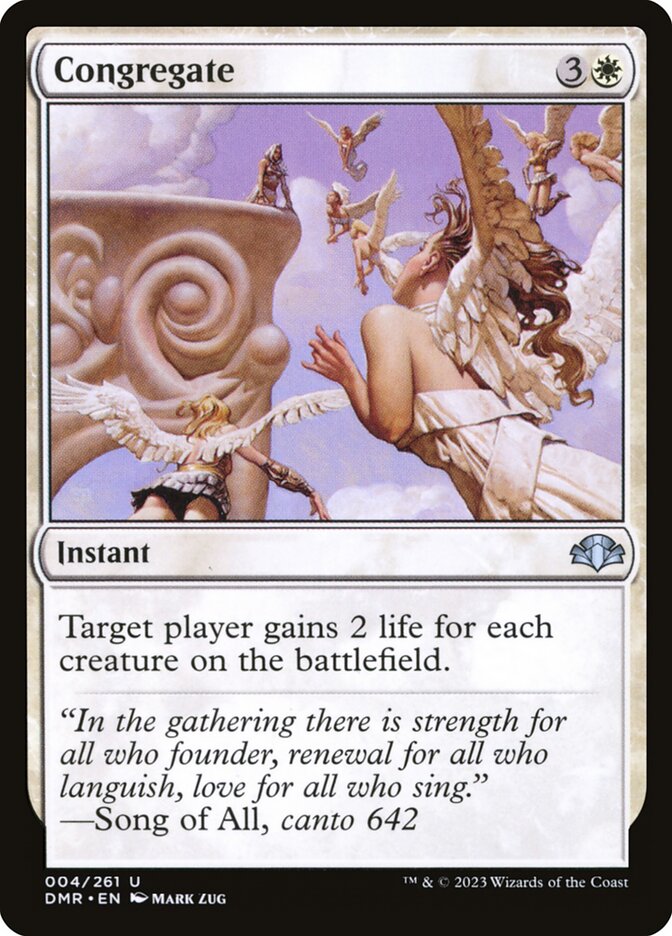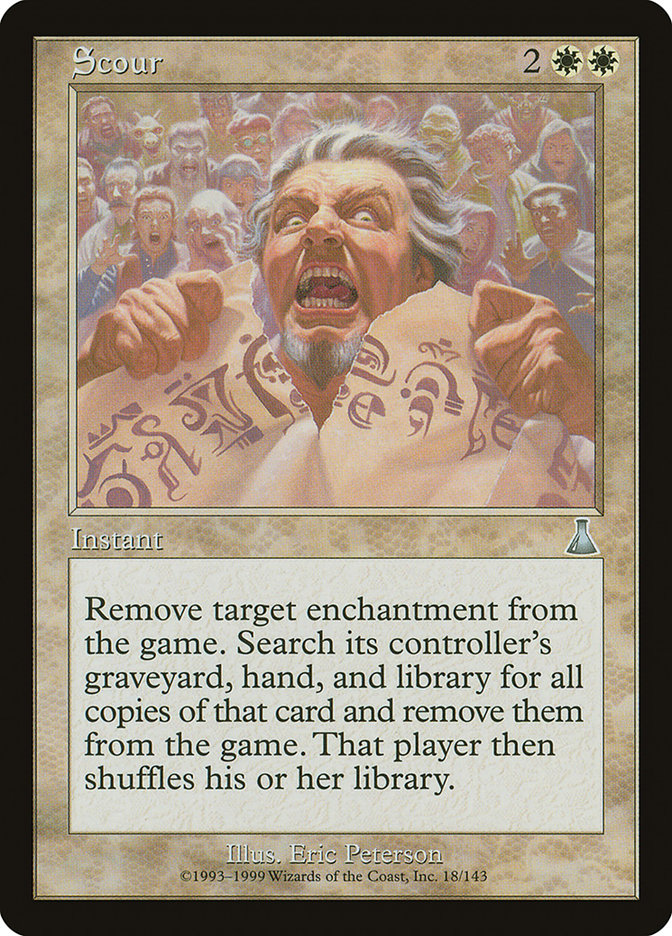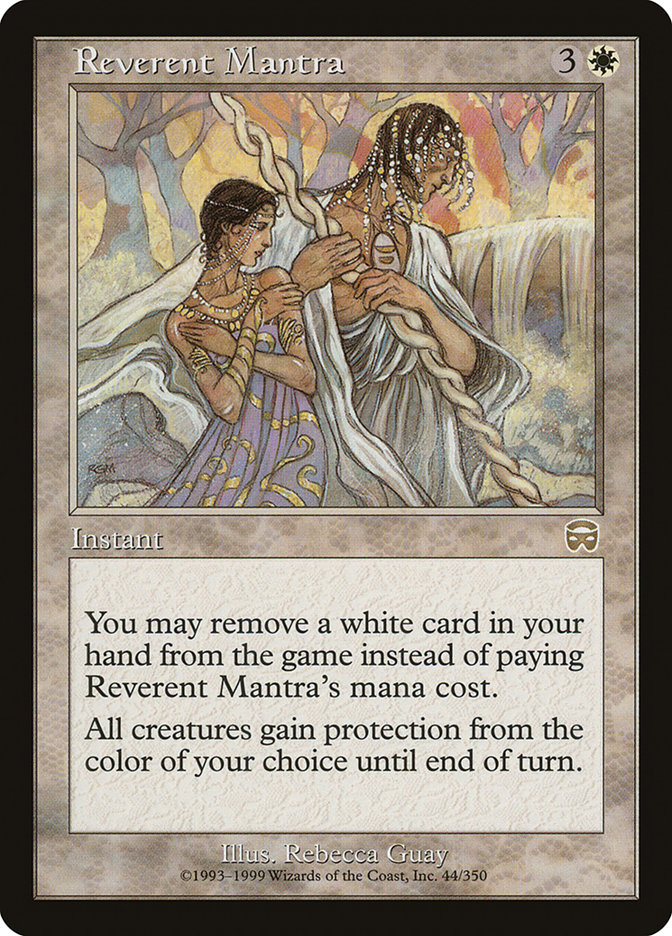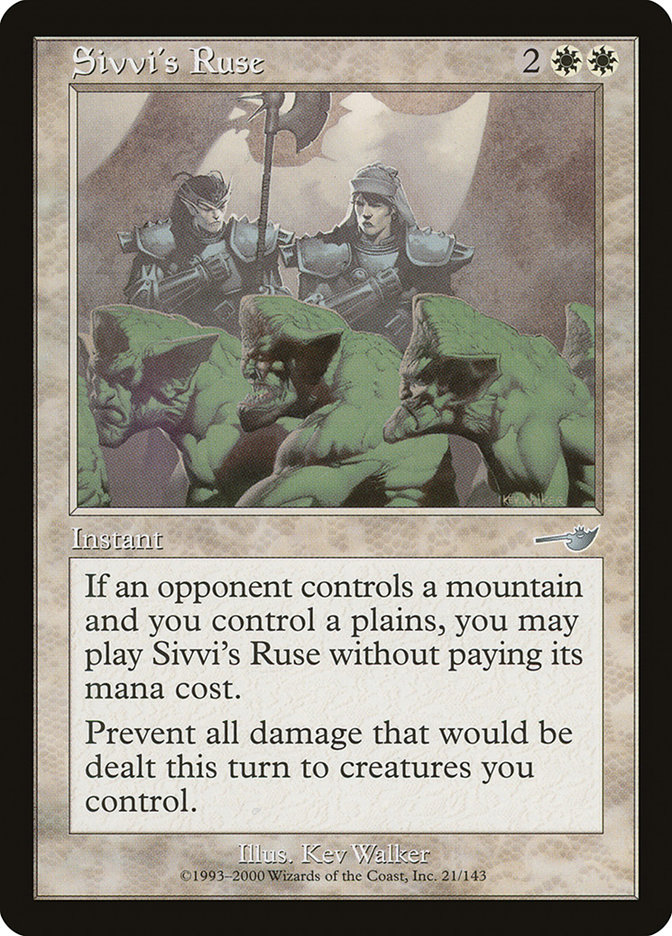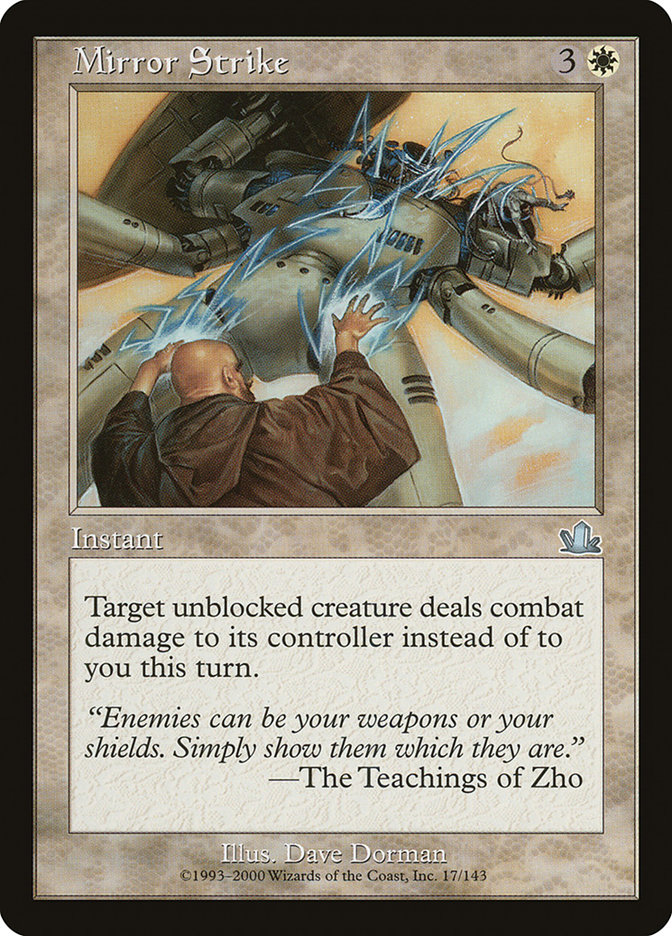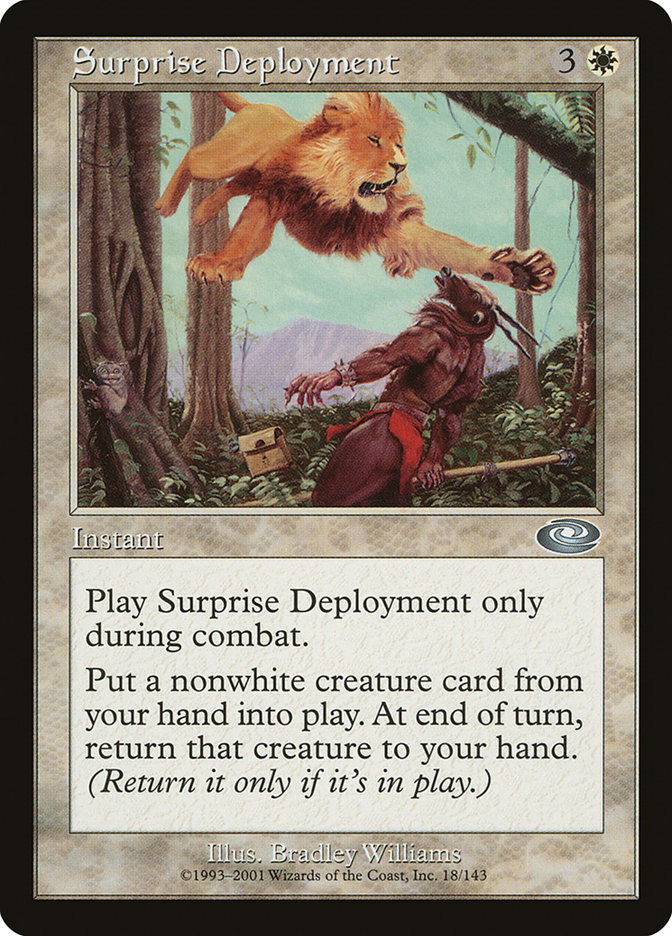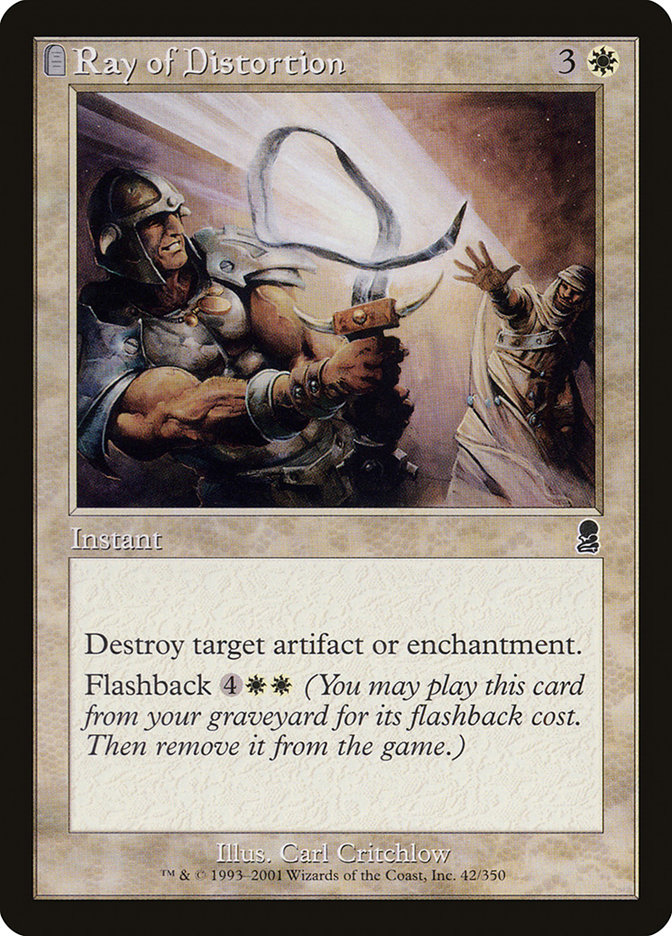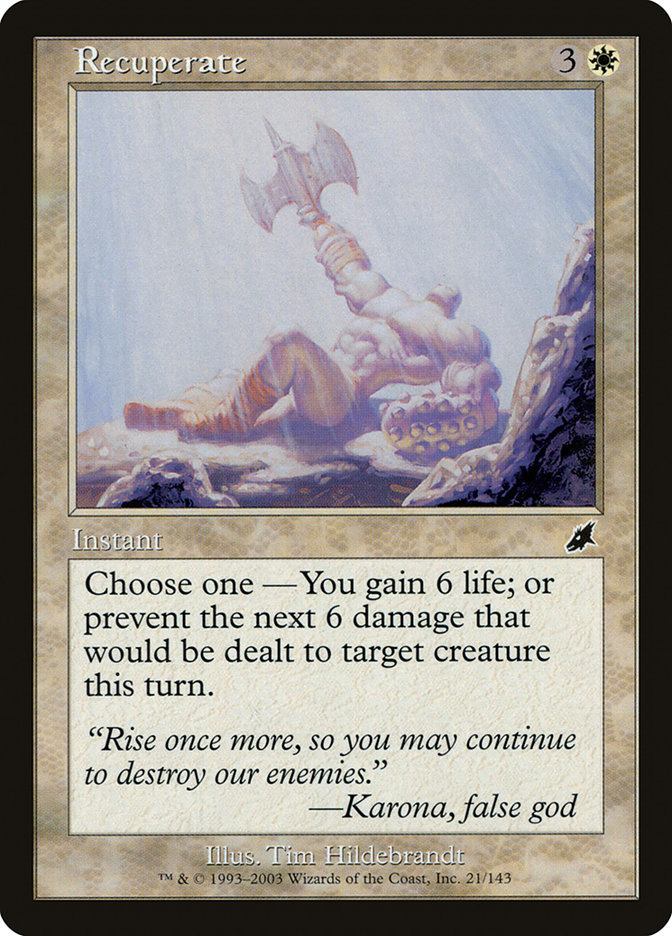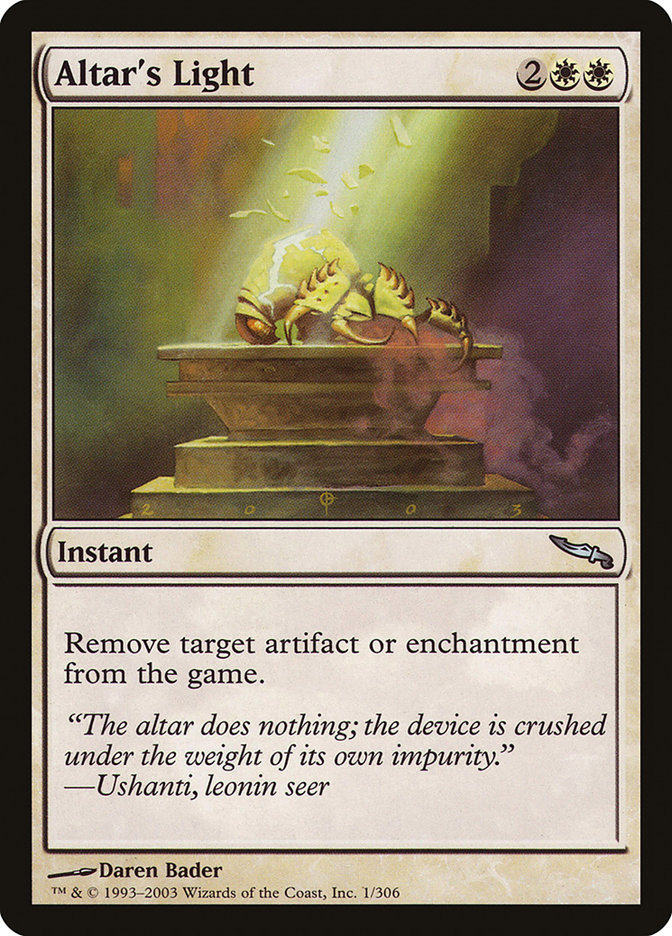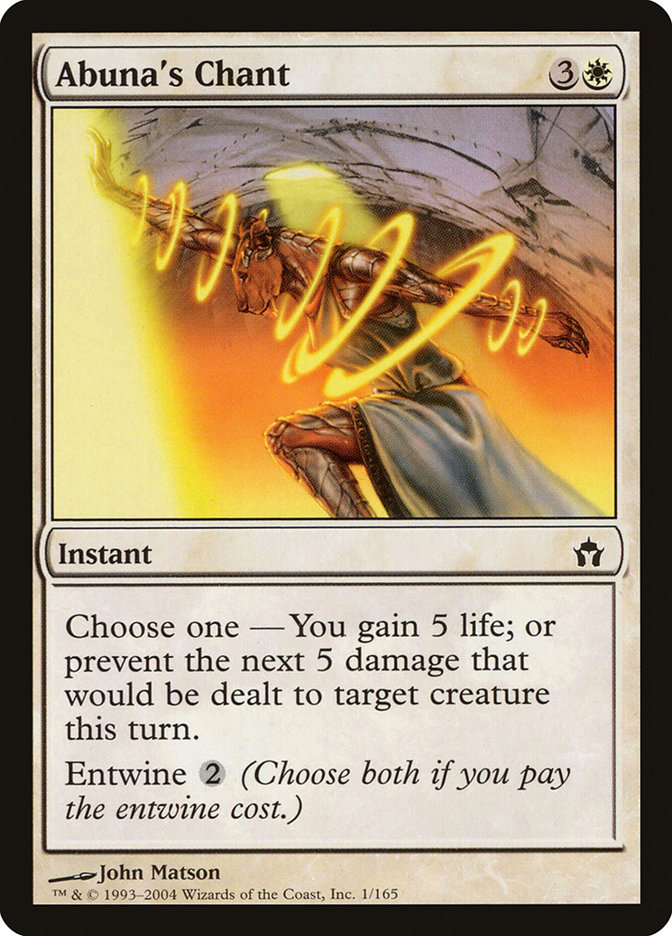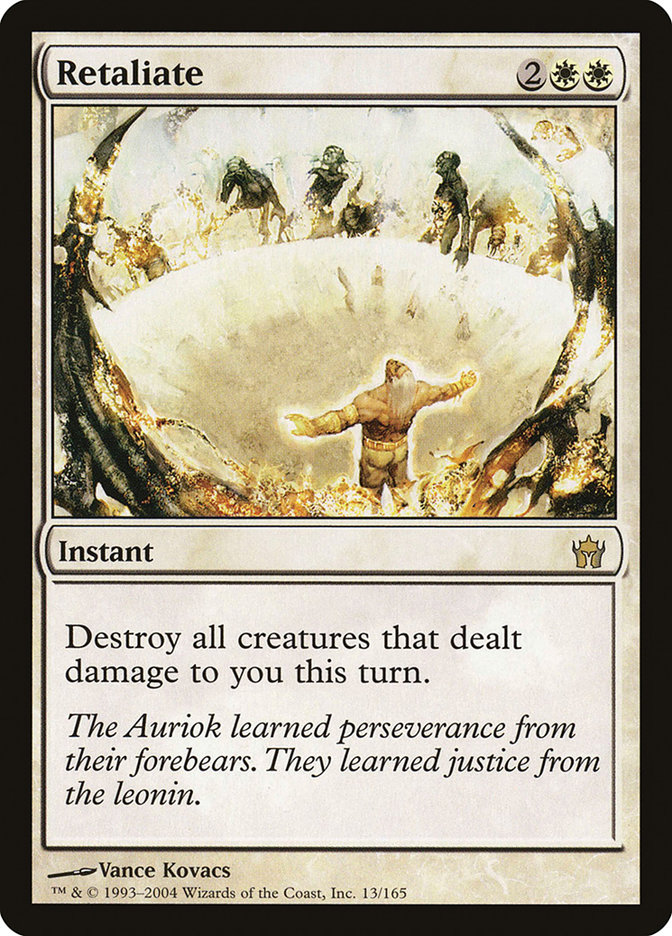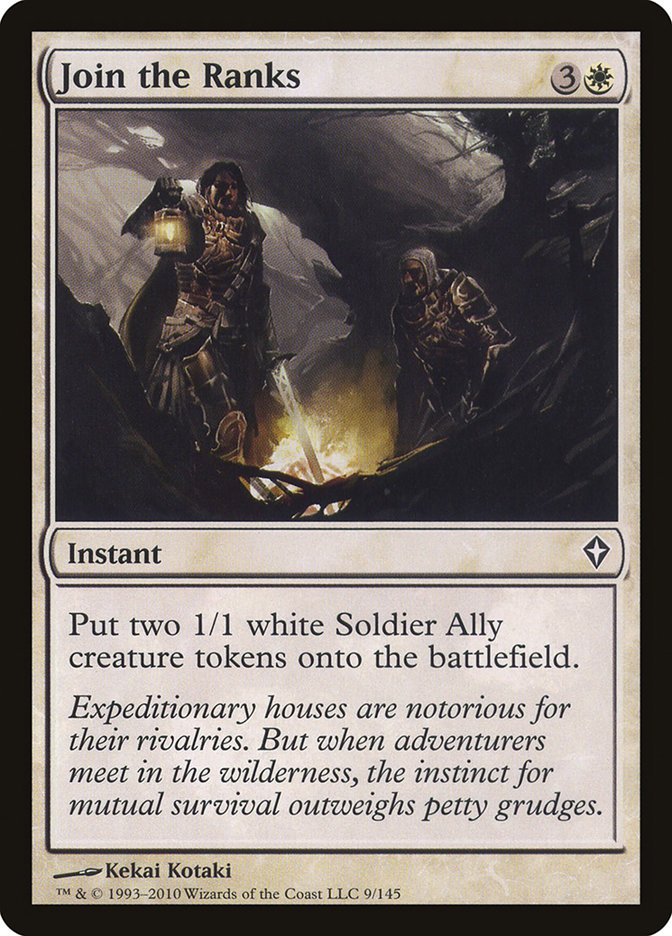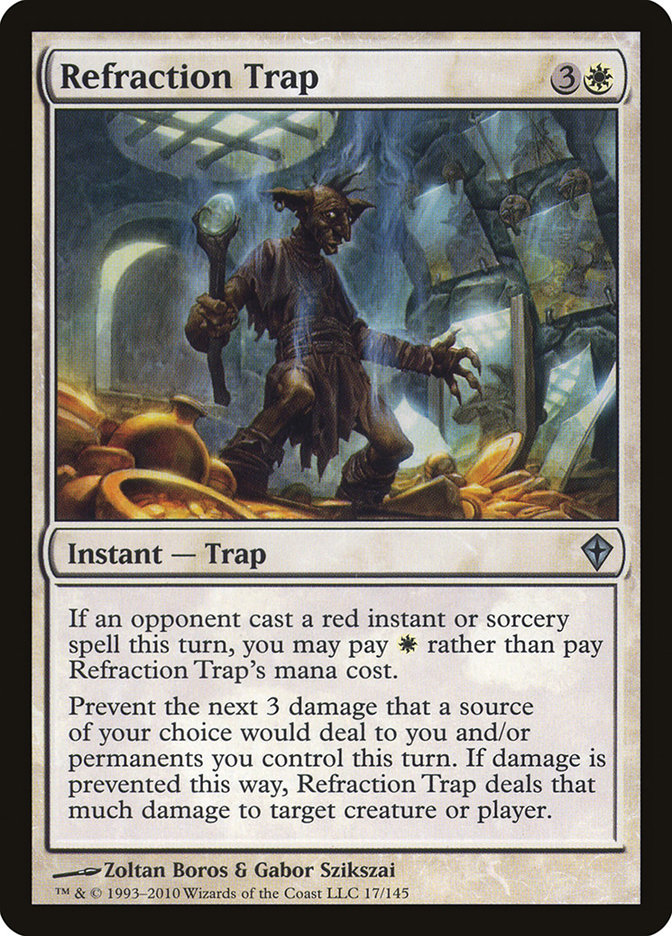Divine Verdict MTG Card
| Card sets | Released in 8 setsSee all |
| Mana cost | |
| Converted mana cost | 4 |
| Rarity | Common |
| Type | Instant |
Text of card
Destroy target attacking or blocking creature.
Giants and pit spawn attempted to topple the cathedral's pillars. The fine grit of their remains still swirls in the breeze outside.
Cards like Divine Verdict
Divine Verdict offers players a potent means of defense in Magic: The Gathering. It aligns with removal spells like Pacifism, which limit opposing threats by preventing a creature from attacking or blocking. However, Divine Verdict goes further by destroying the attacking or blocking creature outright. This stark removal stands in contrast to Pacifism’s more passive approach of simply neutralizing a threat.
Another parallel can be drawn with Swords to Plowshares, a staple in MTG’s history of creature removal. While Swords to Plowshares exiles any creature at an incredibly low cost and instant speed, giving the creature’s controller life points in return, Divine Verdict requires the creature to be actively engaged in combat and comes at a higher mana cost without the compensation of life points.
Finally, there’s Condemn, offering a different twist on combat phase removal. Like Divine Verdict, it addresses creatures engaging in combat but tucks the creature away into its owner’s library rather than destroying it. Despite its lower casting cost, the condition that the creature must be attacking makes it situational, yet versatile.
In the panorama of creature control options, Divine Verdict holds its own, with the ability to decisively impact the battlefield during the heat of combat phases within the MTG environment.
Cards similar to Divine Verdict by color, type and mana cost
Card Pros
Card Advantage: Divine Verdict, while not a direct source of card draw, can disrupt opponents by removing key creatures from their board, effectively diminishing their resources and giving you a tactical edge in the game.
Resource Acceleration: Though it doesn’t directly accelerate your own resources, Divine Verdict can play a vital role in hindering your opponent’s board development, which in turn can tip the resource balance in your favor over the course of a match.
Instant Speed: As an instant, Divine Verdict provides flexibility by allowing players to make decisions reactively. This means you can adapt to threats at the moment, maintaining the element of surprise and making it harder for opponents to predict and plan against your strategy.
Card Cons
Discard Requirement: While Divine Verdict does not actually require a discard, managing resources effectively is crucial, and using four mana on a single removal might leave you unable to play other important spells in your hand.
Specific Mana Cost: Divine Verdict’s mana cost includes two white mana, making it restrictive for multi-colored decks and potentially difficult to cast on curve if you’re not running a mono-white or a deck with heavy white mana base.
Comparatively High Mana Cost: With a casting cost of four mana, Divine Verdict is an expensive removal option. In a format where efficiency is key, other spells at lower mana cost can achieve similar or even better results, leaving Divine Verdict at a disadvantage when considering the speed of the game.
Reasons to Include Divine Verdict in Your Collection
Versatility: Divine Verdict is a removal card that can seamlessly fit into various white decks particularly in Limited format or as a sideboard option in Constructed. It can handle the biggest threats on the board by targeting attacking or blocking creatures, making it a flexible response during combat.
Combo Potential: This card can be strategically combined with tap effects or abilities that force opponents to attack, thus ensuring that the key targets are vulnerable to Divine Verdict’s removal capabilities.
Meta-Relevance: In a metagame dominated by aggressive creatures or decks that rely on a single powerful creature to win, Divine Verdict holds its ground as a solid defensive measure. Its relevance can increase depending on the prevalence of creature-based strategies.
How to Beat Divine Verdict
Divine Verdict is a potent card in Magic: The Gathering, known for its ability to outright destroy an attacking or blocking creature. Surviving this spell requires a smart playstyle and timely choices. Players can outmaneuver Divine Verdict by being cautious with their most valuable creatures. Instead of committing a single powerful creature to attack or block, consider diversifying the threat across multiple creatures to reduce the impact of potential removals.
Having a counter spell ready can also be a critical strategy for blue deck players, providing a safety net against such targeted removals. Additionally, cards like Dive Down or Blossoming Defense that grant hexproof or indestructible can save your creature from the Divine Verdict’s effect, by making your creatures un-targetable or immune to destruction for the turn. With these strategies, it’s possible to dilute the threat posed by Divine Verdict and maintain a strong board presence.
Ultimately, it’s about anticipating your opponent’s moves and having a backup plan. Whether through countering, protecting, or overwhelming, smart management of creature resources will help you navigate around the danger of Divine Verdict and continue to press the advantage in your Magic: The Gathering matches.
Where to buy
If you're looking to purchase Divine Verdict MTG card by a specific set like Magic 2010 and Magic 2013, there are several reliable options to consider. One of the primary sources is your local game store, where you can often find booster packs, individual cards, and preconstructed decks from current and some past sets. They often offer the added benefit of a community where you can trade with other players.
For a broader inventory, particularly of older sets, online marketplaces like TCGPlayer, Card Kingdom and Card Market offer extensive selections and allow you to search for cards from specific sets. Larger e-commerce platforms like eBay and Amazon also have listings from various sellers, which can be a good place to look for sealed product and rare finds.
Additionally, Magic’s official site often has a store locator and retailer lists for finding Wizards of the Coast licensed products. Remember to check for authenticity and the condition of the cards when purchasing, especially from individual sellers on larger marketplaces.
Below is a list of some store websites where you can buy the Divine Verdict and other MTG cards:
 BUY NOW
BUY NOW BurnMana is an official partner of TCGPlayer
- eBay
- Card Kingdom
- Card Market
- Star City Games
- CoolStuffInc
- MTG Mint Card
- Hareruya
- Troll and Toad
- ABU Games
- Card Hoarder Magic Online
- MTGO Traders Magic Online
See MTG Products
Printings
The Divine Verdict Magic the Gathering card was released in 8 different sets between 2009-07-17 and 2022-12-02. Illustrated by 3 different artists.
| # | Released | Name | Code | Symbol | Number | Frame | Layout | Border | Artist |
|---|---|---|---|---|---|---|---|---|---|
| 1 | 2009-07-17 | Magic 2010 | M10 | 8 | 2003 | Normal | Black | Kev Walker | |
| 2 | 2012-07-13 | Magic 2013 | M13 | 12 | 2003 | Normal | Black | Kev Walker | |
| 3 | 2013-09-27 | Theros | THS | 8 | 2003 | Normal | Black | Raymond Swanland | |
| 4 | 2014-07-18 | Magic 2015 | M15 | 271 | 2015 | Normal | Black | Kev Walker | |
| 5 | 2015-07-17 | Magic Origins | ORI | 274 | 2015 | Normal | Black | Kev Walker | |
| 6 | 2017-04-15 | Welcome Deck 2017 | W17 | 1 | 2015 | Normal | Black | Kev Walker | |
| 7 | 2018-01-19 | Rivals of Ixalan | RIX | 5 | 2015 | Normal | Black | Slawomir Maniak | |
| 8 | 2022-12-02 | Jumpstart 2022 | J22 | 177 | 2015 | Normal | Black | Kev Walker |
Legalities
Magic the Gathering formats where Divine Verdict has restrictions
| Format | Legality |
|---|---|
| Historicbrawl | Legal |
| Historic | Legal |
| Legacy | Legal |
| Paupercommander | Legal |
| Oathbreaker | Legal |
| Gladiator | Legal |
| Pioneer | Legal |
| Commander | Legal |
| Modern | Legal |
| Pauper | Legal |
| Vintage | Legal |
| Duel | Legal |
| Explorer | Legal |
| Predh | Legal |
| Penny | Legal |
| Timeless | Legal |
Rules and information
The reference guide for Magic: The Gathering Divine Verdict card rulings provides official rulings, any errata issued, as well as a record of all the functional modifications that have occurred.
| Date | Text |
|---|---|
| 2009-10-01 | A “blocking creature” is one that has been declared as a blocker this combat, or one that was put onto the battlefield blocking this combat. Unless that creature leaves combat, it continues to be a blocking creature through the end of combat step, even if the creature or creatures it was blocking are no longer on the battlefield or have otherwise left combat. |
| 2009-10-01 | An “attacking creature” is one that has been declared as an attacker this combat, or one that was put onto the battlefield attacking this combat. Unless that creature leaves combat, it continues to be an attacking creature through the end of combat step, even if the player it was attacking has left the game, or the planeswalker it was attacking has left combat. |
| 2012-07-01 | Destroying a blocking creature won't cause any of the creatures it was blocking to become unblocked. They won't deal combat damage to the defending player or planeswalker (unless they have trample). |
